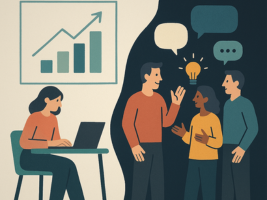THE QUOTE:
“Learning & Development needs a makeover…It’s time for a change.” – Clark Quinn
THE JOURNEY:
‘Learning at the speed of need’ is a significant factor that powers up workplaces around the world today. However, after reviewing our many years of work, we realise today that training in isolation is rarely the RIGHT answer for most performance problems, since performance-related issues could find roots in numerous other aspects in the workplace. This great realisation also seems to have dawned on the Learning and Development (L&D) function, which has been doing its best to address these performance issues through ‘trainings’ all these years.
The result? The transformation from the traditional role of ‘Learning & Development’ to the challenging role of ‘Performance Consulting’ in spite of many obstacles resisting such change!
We, at Learnnovators, believe this (need for change) too, and have been continuously striving to advice and offer performance support solutions as an integral part of our learning development services. We have also been trying to leverage the power of emerging technologies for designing and developing cost effective and powerful performance support solutions.
Today, after publishing a brilliant interview on this topic with Cathy Moore, we thought of getting ourselves updated on the latest trends related to this topic, and set out on a quick journey.
Below are the questions we had in mind when we embarked on our journey:
- How is corporate L&D changing in workplaces around the world? What are the factors that are triggering these changes?
- What are the key trends? What is the future?
- What are some of the interesting use cases/stories that could inspire others?
- What are some of the useful resources available on this subject?
OUR FINDINGS:
Below are some of the interesting resources on this subject that we would like to share with you.
Quotes
- “Unfortunately the current approach in L&D is to assume things about learners (rather than to actually analyze what their jobs are like) and to deliver the “solution” as a one-time, one-size-fits-all course.” – Cathy Moore (in our interview with her)
- “There’s a ‘conspiracy of convenience’ between many learning & development managers and business managers, which serves as a barrier to effective L&D operations.” – Charles Jennings (in our interviewwith him)
- “Most L&D really seems stuck in the Industrial Age, but we’re working in the Information Age.” – Clark Quinn (in our interview with him)
- “L&D is one of the most conservative professions.” – Clive Shepherd (in our interview with him)
- “One training event is not sufficient for people to transfer learning to new situations.” – Connie Malamed (in our interview with her)
Survey/Research Results
- CIPD/Cornerstone OnDemand Annual Learning and Development Survey: “The future of L&D is changing and employers, now more than ever, are aligning learning and developing initiatives to business strategy.” This report discusses the key findings of the CIPD/Cornerstone OnDemand Annual L&D Survey.
- Learning With Impact: How L&D Can Deliver Better Business Results: As per the findings of this research conducted by learning and development consultancy Profitability, L&D is failing to deliver for two-thirds of UK organisations. The study found that only 33 per cent of those involved in designing and delivering L&D said it had a lasting impact on their people or organisation. Read on for more interesting and thought provoking findings.
- Learning in the Workplace Survey 2014: Here are the results of the 2014 Learning in the Workplace Survey (conducted annually by Jane Hart) in which over 1,000 respondents worldwide rated the importance of 10 different ways of learning in the workplace. As per these results, company training/e-learning is the lowest rated way to learn at work, and knowledge sharing within teams is the highest rated way to learn at work.
- 2nd Annual Learning & Development Technology Report: This report from the second annual Learning & Development Technology survey (conducted by the Impact Instruction Group) includes some interesting insights on the changes in L&D technology behaviors and trends, specifically in mobile learning.
- Perception vs Reality in L&D: How’s Your L&D Reflection Looking Today?: These survey results of the UK Learning Trends Index (produced by GoodPractice in partnership with The Corporate eLearning Consortium, The Charities Learning Consortium, Reed Learning and INL Consultancy Work) gives a fresh view on the current state of L&D in UK today. Check this infographic that depicts five key findings from the survey (along with some Killer Questions), in case you are hard pressed for time.
- 5 Practical Ideas for Embedding Learning Into The Workflow: This report (from Towards Maturity) highlights the role of the L&D professional to equip their organisations with the ability to change in order to be successful in this century, and provides five practical ideas for embedding learning in the workflow. It draws inputs from top performing learning companies in the Towards Maturity Benchmark and insights from thought leaders in the field.
- Learning at the Speed of Need: This report highlights the key insights of the research conducted by City & Guilds Kineo in partnership with E-Learning Age to explore the trends in learning technologies, the challenges facing L&D departments and how L&D responds to the challenges they face. It presents some brilliant insights in the form of top ten tasks for L&D (in 2014).
- Future-proof Your L&D: This is a must-read report (from TrainingZone in partnership with the Chartered Management Institute (CMI) and the Learning and Performance Institute), in which experts from many industries share their great experiences about the mistakes they made (in the context of performance improvement), how they were able to overcome those challenges, and the top take-aways that they could apply to their future projects.
Use Cases & Scenarios
- Re-engineering L&D at Xerox Europe: Check out this inspiring case study for insights into how Darrell Minards (Head of Learning & Development for Xerox, Europe) and his team re-engineered learning and development to make Xerox seen as a thought-leader and a key business enabler. This also includes tips for re-engineering L&D.
- The Adidas Group’s New Way of Learning: Here’s another inspiring article that discusses how Adidas re-imagined learning with its new vision called ‘New Way of Learning’ by blending learning with work. Also check out this video, and this Forbes post to know what L&D can leverage from this experience.
- Social Learning Examples in the Workplace (2011): Here is a valuable collection of stories (from Jane Hart) of how people and organisations are leveraging the power of social learning in order to improve job, team and business performance and productivity.
Presentations/Webinars
- L&D in a Social World: This breakfast briefing (by Jane Hart) presents her views on how the social web is impacting the way we learn, and suggests some new and effective ways to support workplace learning in this social learning age.
- Preparing for the Network Era Workplace: This presentation by Harold Jarche discusses the changing nature of workplace learning (from ‘formal’ to ‘informal’ and ‘social’), and the move (of work) towards a ‘creative economy’.
- The L&D Challenge for 2014: Balancing Business Priorities and Individual Needs: Here’s a webinar (by Laura Overton of Towards Maturity) that discusses ways to properly balance business priorities and individual needs – one of the modern day challenges of today’s L&D department – that will help engage more learners and deliver against the bottom line.
- Why Corporate L&D Need to Change and How: This presentation by Mike Collins takes a look at the evolving changes happening to workplace learning, and ways to address this challenge.
Videos
- The Learning & Development Change Grid: In this video, Donald H Taylor (Chairman of LPI, LSG, and the Learning Technologies Conference) explains how Learning and Development Departments need to change their attitude to keep pace with the rest of the business in today’s modern world. He uses ‘The Learning & Development Change Grid’ – his model – for explaining this concept.
- Transforming Learning and Development: In this video, Clive Shepherd looks at the most common problems today’s L&D face. He also shares a vision for the future and explores strategies to help achieve the vision.
- Key L&D Trends in 2014: What will change in the world of learning and learning technology over the next 12 months? This video (by Reed Learning and Donald H Taylor of The Learning and Performance Support Institute) takes a look at the present trends in L&D, and the significant things that will change in the world of learning and learning technology this year.
- Transforming Organisational Learning: This video by Jane Hart includes some brilliant insights on ways to transform organizational learning.
Articles/Posts
- 2014: The Year For Change In L&D?: This article (by Jo Faragher) discusses the trends and key drivers for change for L&D this year based on interviews with some of the industry experts and backed by research findings.
- The Caveat of the Performance Centre: This post from Ryan Tracy triggers a few thought-provoking questions:
- “Are L&D professionals the right fit for handling performance issues at workplaces?”
- “Do L&D professionals have the necessary skill set to handle the role of Performance Consultants?”
- Who are the Performance Consultants Really?: A brilliant post by Andrew Gerkens that explores why performance consulting shouldn’t be limited to L&D practitioners or an L&D solutions mindset.
- The Role of the L&D Function IS Changing: A ‘must read’ (from Jane Hart) that explores some of the emerging ‘new roles’ for learning and performance professionals in the changing scenario of workplace learning.
- Role of L&D in the 21C Workplace: An insightful post (by Sahana Chattopadhyay) that discusses the new role of L&D in today’s workplaces in the context of the new skills that the work in organisations demand.
- The L&D Identity Crisis: This post by Paul Matthews states the significance of L&D taking up the new role of performance consultant (and stop acting as an ‘order taker’ for training courses) in order to be effective in helping solve performance problems at workplaces.
- The Changing Role of L&D: This is another insightful post from Jane Hart that explores the changing role of L&D – from ‘packaging’ of content to ‘scaffolding’ plus ‘social capability building’.
- Four Big Insights From ASTD 2014: Check this blog post (by Shum Attygalle of Axonify Inc.) that shares some interesting insights after hearing attendees’ stories of learning challenges in the ASTD 2014 event.
- 50 Big Ideas to Change L and D: An awesome post from Andrew Jacob that carries 50 wonderful ideas to change L&D. Check out the post to see which of the ideas resonate with you the most.
- L&D Capability – Performance Consulting: This post (from the 70:20:10 Forum) along with the Aide Memoir it includes is worth checking for its value in helping us apply and improve our performance consulting skills.
- Would You Recommend Your L&D Department?: A thought-provoking article (from Jay Cross) that discusses the significance for L&D to satisfy line leaders, and using the Net Promoter Score® methodology for measuring the confidence and loyalty of line leader customers.
- The Changed Role of L&D: Evolve Now or Become Extinct: In this post, Randy Emelo shares his insights on how today’s L&D practitioners need to move their roles forward in their organisations.
Whitepapers
- How New Technologies are Changing L&D Delivery: A brilliant whitepaper (from Donna L Rhode of UNC Kenan-Flagler Business School) that explores how new and emerging technologies are impacting L&D, and the steps that L&D practitioners can take to introduce these into their organisations.
- Performance Support – The Secret of L&D Success?: This whitepaper (by Imogen Casebourne and Rhodri Jones of Epic Learning Group) looks at the significance of including performance support as an essential ingredient in workplace training.
Pins
- L&D Responses to Change: Here are some interesting but thought-provoking pins (curated by Jane Bozarth) that depict the reaction of L&D to evolution/recognition of workplace learning.
Books
- Revolutionize Learning & Development: In this book, Clark Quinn takes a straightforward look at how people really learn, and shares his insights about how L&D needs to change to support this. The book includes practical steps for rethinking, redesigning, and reestablishing learning delivery that will help L&D make a meaningful impact on their organizations. Check Clark’s brief on his book that he shared in our interview with him here. Also check this brilliant review by Charles Jennings.
- Flat Army: This widely discussed book by Dan Pontefract discusses ways to help transform organizations and employees who are ‘disengaged’ due to decades of command and control leadership. The book surfaces on strategies to create a leadership culture that drives engagement, empowerment and encouragement amongst continued execution. These are presented in the form of five key frameworks that can help you and your organization make the shift. To quote Dan, “Flat Army is designed to prevent an organization’s ship from sinking.”
- Transforming Learning and Development: This book (by Clive Shepherd) describes how transformation can take place in workplace learning and development. It starts with a vision that is aligned, economical, scalable, flexible, engaging and powerful. It then discusses six changes that will help you realize this vision. And, finally the book details the practical steps that you need to take to make this transformation happen.
- Social Learning Handbook 2014: This book (by Jane Hart) that has gained immense popularity in the L&D world, discusses some of the key ways that organizations can start to support social workplace learning.
- Show Your Work: The Payoffs and How-To’s of Working Out Loud: This book (by Jane Bozarth) focuses on an interesting concept: How L&D can extend its reach by showing its own work (and helping others show theirs). The book edited by Rob Hubbard includes lots of practical tips, examples, and stories. It also features thoughts by global e-learning experts including Clive Shepherd, Laura Overton, Lars Hyland, Rob Hubbard, Julie Wedgwood, Jane Hart, Colin Steed, Clark Quinn, Ben Betts and Charles Jennings.
- The Really Useful eLearning Instruction Manual: This book (edited by Ron Hubbard) features wonderful insights from some of the global e-learning experts. It is a practical guide to all the key topics in e-learning, and serves as your toolkit for putting e-learning into practice in your organisations.
Programs & Initiatives
- L&D Manifesto: Check this inspiring initiative (released last year) by Cathy Moore that focuses on all aspects of workplace learning to proclaim the arrival of a ‘new order’.
- Serious eLearning Manifesto: A great initiative to raise the quality of e-Learning launched recently by Michael Allen, Clark Quinn, Julie Dirksen, and Will Thalheimer. Like many out there, we too are of the opinion that this initiative shouldn’t be limited to only ‘e-learning’ and should encompass all forms of workplace learning. Check the 22 principles that the manifesto contains for a complete understanding of the purpose. Click here to become a signatory and pledge to promote Serious eLearning.
- Social Learning Practitioner Programme: The Social Learning Practitioner Programme (SLPP) is a self-paced learning program offered by The Connected Workplace that aims at helping you develop your own personal social learning skills as well as work (and learn) collaboratively with your team.
- 70:20:10 Forum: Check out the 70:20:10 Forum (founded by Charles Jennings with Heather Rutherford in 2013) that aims at developing the capability of L&D and HR professionals, and supporting them to implement, embed and sustain the 70:20:10 learning framework within their organizations.
Tools
- The Learning and Performance Institute (LPI) Capability Map: This is an online tool that allows learning professionals to self-assess their skills. It spans 9 category areas which contain a total of 27 skills, with four levels of competence for each skill. The report, which is based on self-assessments of 983 L&D professionals against LPI’s Capability Map, makes it highly reliable.
- The 70:20:10 Implementation Toolkit: Check out this 70:20:10 Implementation Toolkit – a library of customizable resources (such as activities, workshop kits, articles, webinar recordings and podcasts) that is aimed at helping L&D successfully implement the 70:20:10 learning strategy within their organizations.
OUR LEARNINGS:
As we came to the end of our search, we had the following learnings as ‘take-aways’ from our little journey:
- Emerging technologies and learning trends of today are transforming workplace learning, and hence the corporate L&D. What we see is ‘Smart Technologies’ enabling ‘Smart Learners’ that signifies the need for a ‘Smart L&D’ with ‘new’ roles.
- Here is our vision of how corporate L&D needs to change in order to align with the dynamically changing demands of this knowledge age:
- Transform ‘training’ into ‘performance consulting’
- L&D practitioners change themselves, and more importantly, be the ambassadors of this change movement
- L&D practitioners step up (by re-skilling themselves) to take on the new role of “enablers”
- However, the challenging question that we have in front of us still is “Could performance consulting be limited to L&D practitioners or an L&D solutions mindset?” We feel that performance consulting can’t be limited to L&D practitioners (or an L&D solutions mindset) not just because of the lack of skillsets that they presently possess for handling the bigger role of performance consultants, but because this (role) demands a holistic view and knowledge of different functions of business. We foresee L&D playing a major role as a ‘connector’ in this consulting model that includes experts from other functions as well. However, we feel that this topic demands elaborate thinking, and will evolve over time in order to agree upon (and arrive at) the most effective solution for our business.
What other changes are happening in corporate L&D? What are some of the interesting thoughts and experiences (from your workplace) that you would like to share? What are other interesting stories that you have come across?
We would love to hear from you.
Written by Santhosh Kumar
_________________________________
Published on 15-Aug-2014






